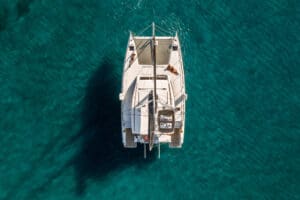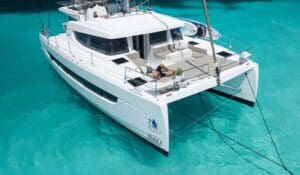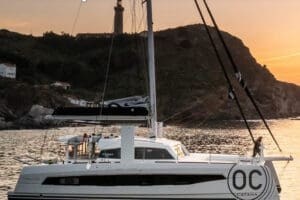During our sailing schools, we always do a fun “Do you recognize this nautical phrase?” session. Not only is it a fun back and forth session, but we learn so much from history! These phrases come from our seagoing ancestors from way back when and we still use them everyday. But few people know the origins of these phrases.
sailing schools, we always do a fun “Do you recognize this nautical phrase?” session. Not only is it a fun back and forth session, but we learn so much from history! These phrases come from our seagoing ancestors from way back when and we still use them everyday. But few people know the origins of these phrases.
For instance, the origination of the word “posh” means “port out, starboard home”, referring to the preferred cabins, overlooking the continent, on the way to India. Who knew?
The meaning of some of the more common phrases, like “rocking the boat” or “on an even keel” are easier to figure out but some of them will leave you confounded! Here are some other nautical terms that we use all the time!
All hands on deck: an order for all crew members to assemble in an emergency – a call for everyone available to be available to assist with an activity or event.
Anchor’s aweigh: a comment made when a vessel’s anchor is clear
Bitter end: the last segment of a rope or chain – the final portion of a difficult or unpleasant task or occurrence
Even keeled: well balanced — said of a vessel – steady, even tempered
Shake a leg: make haste – move quickly
Stem to stern: the forward end of the bow to the rear part of the vessel; the entire vessel – front to back, beginning to end, or all-inclusive
Wide berth: a significant distance between one vessel and another – plenty of space
Clean Bill of Health: This widely used term has its origins in the document issued to a ship showing that the port it sailed from suffered from no epidemic or infection at the time of departure.
Down the hatch: This is a drinking expression that seems to have its origins in sea freight, where cargoes are lowered into the hatch. First used by seamen, it has only been traced back to the turn of the century.
Port and Starboard: Port is to the left of a ship; starboard, to the right, when facing the bow. So unlike “left” and “right”, “port” and “starboard” refer to fixed locations on a boat. In the early days of boating, before ships rudders were on their centerlines, boats were controlled using a steering oar. Most sailors were right-handed, so the steering oar was placed over or through the stern’s right side. Combining two Old English words “stéor” meaning steer and “bord” meaning side of a boat, the word “starboard” soon came to refer to the steering side which was the right side of the boat. As boats and their steering oars grew in size, it became much easier to tether to the dock using the opposite side from the oar. This left side became known as larboard or “the loading side.” But it was easily confused with starboard and was replaced with “port” since when docked, this is the side that faced the port.
Land HO!: This cry let the crew know land had been spotted and the voyage’s end is near.
Landlubber: “land lover” describing someone who is not at ease at sea, on a boat, or tends to get seasickness.
Show One’s True Colors: Hoisting flags to declare the ship’s origin was commonplace, but not all captains told the truth. Flying false flags was often used to trick enemies. The term has become familiar with non-sailors with showing your true colors meaning revealing falsehood or true nature.
Scuttlebutt: In the 1800s, the fresh drinking water barrel was called a scuttlebutt. Like in offices where the water cooler is a gathering place to chat and gossip with each other, the scuttlebutt was “information central”. By the 1900s, the term scuttlebutt became a synonym for information.
Shanghai: The city in China was often the location of many kidnappings in which people were pressed into service aboard ships. To be “Shanghaied” is to be taken or betrayed.
Loose Cannon: When a cannonball stored on a ship jumped out of its storage slot and rolled across the deck, usually wildly depending on seas, it created a very dangerous situation for sailors, especially those tasked with retrieving it. The phrase has come to describe a person who is unpredictable most often in a perilous way.
Three Sheets to the Wind: Before backup engines made loss of sail power less dangerous, losing sails to the wind usually meant all control of the ship was lost. So the term has come to describe people who over-imbibe losing all control of themselves.
Hunky Dory: An Anglicized pronunciation of “honcho dori”, the name of the main street that led sailors back to the port. There are 2 suggestions as to how its meaning of being “ok” or “perfect” came to being:
- If they found honcho dori, they knew they were headed the right way back to their ship…perhaps in an inebriated state, this was quite helpful.
- Others suggest that the road catered to the sailors’ “needs” making them feel hunky-dory.
Ahoy: “Hoy” was a medieval English greeting from the Dutch “hoi”. Sometime before its first written reference in the 1751 novel, The Adventures of Peregrine Pickle, by Tobias Smollett, “ahoy” became a signal word between sailors on passing boats. By 1813, “ahoy” was widely used in the English language becoming a fun greeting outside the maritime world and quickly became a familiar term in other languages.
In the Doldrums: The doldrums are an area near the equator where surface wind is sparse with little chance of filling one’s sails putting boats at a standstill. The phrase has come to mean moving slowly or stuck in a standstill outside nautical situations.
Turn the Corner: This idiom was used by sailors to describe arriving into safer waters after passing critical points such as the Cape of Good Hope at the southern tip of Africa or Cape Horn at the south end of South America.
Pipe Down: The boatswain communicated tasks to the crew by sounding through a pipe. One tone was to step down from duty for the night or “pipe down”.
Toe the Line: While under inspection, sailors were expected to stand in a straight line with their toes behind deck planking, a “line”.
All Hands on Deck: During trouble or when called for an inspection, captains called out for all crew to be present, accounted for, and working as directed. Now the phrase is used frequently whether on a boat or not.
Long Shot: When a cannon was shot at a target further away, the probability of hitting the target were low without luck.
Feeling Blue: If a ship’s officer died at sea, vessels raised a blue flag and painted a blue stripe on the hull as a sign of mourning. Today, the term has been more generalized to mean feelings of sadness.
High and Dry: If a ship was caught in low tide or ran aground a sandbar or shoals, it was easily stranded with no hope of recovery. It was stuck up out of the water.
Dead in the Water: Lack of wind kept ships from making progress were often called being “dead in the water”. The phrase today is often heard to refer to a severe situation where no progress seems possible.
Learn the Ropes: Sails were raised and lowered with ropes. Knowing how to use the ropes to control the sails enabled a boat to take the best advantage of the wind and sail safely. So while learning the ropes was literal back then, today, it means to become completely familiar with a skill or topic.
Hand Over Fist: Raising and lowering sails via a pulley system required placing one hand over the other in a consistent movement. It was a term used to describe being quick or deft in accomplishing the job.
Here are a few more related to the origin of calling a toilet on a boat the head and a some less than savory terms.
See some more fun terms and phrases from Yachting & Boating World





